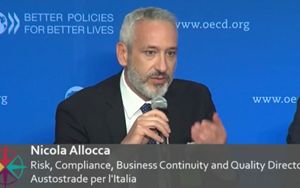(Finance) – It’s called “Action to Impact: Working Together to Strengthen Integrity and Fight Corruption”, The OECD Forum arrived at tenth edition, on the topic ofthe fight against corruption. In the center of the two days, in particular, how the public and private sectors can work together to address issues such as mismanagement of public funds, international corruption, tax fraud and opaque lobbying practices.
In the introductory session – alongside high-profile institutional and corporate representatives, such as the Deputy Minister of Infrastructure in Ukraine, Serhii Derkach, the Vice-Presidents of Microsoft Becky, Lenaburg and Nina Martin, head of Bechtel, the largest construction and engineering company in the USA, the Director of Risk, Compliance and Quality of Autostrade also took the floor for Italy, Nicola Allocca, who is also President of the OECD Business Anti-Corruption Committee (BIAC), the body that encompasses best practices on the subject of legality and includes representatives from over 30 countries.
During “Racing to Zero – Education and Digital as enablers in breaking biases to eliminate corruption” Allocca presented the ASPI “Next to Legality” program and the “Zero Corruption” Manifesto for the 18th SDG.
What are the consequences of corruption in infrastructure? The risk is potentially very high, especially if we think of the next generations. The direct impact effects of poor prevention and implementation of the system good anti-corruption models they certainly fall on the safety and security standards of the infrastructures, on the quality of services, on costs, on the punctuality of project delivery and on the management of the supply chain. But it doesn’t end here: indirect but equally serious costs also affect climate changewith a potential delay in the creation of key infrastructures to face global challenges, such as global warming. This is why it becomes essential to simplify the rules of the game, including new skills and new tools in the fight against corruption”, underlined Allocca: “If we allow corruption to deprive the next generation of critical assets such as modern, smart, innovative, safe and even resilient infrastructure, we will inflict an intolerable burden of inequality on our children.”
Artificial intelligence applied to infrastructurere – Even the physical and territorial infrastructures are becoming intelligent, applying systems based on an interactive and increasingly cognitive dialogue, between men and work equipment. In this sense, anti-corruption programs also need to be rethought, depending on the new context, constantly evolving.
For Allocca, in particular“we have to act in three different directions”: “In the first place, it is necessary to change the vision of the fight against corruption, in order to reach the zero corruption goal. This means that the new protocols will be designed with the aim of eradicating corruption, rather than managing its risk. Companies will have to seriously evaluate their actions, not only from an economic and financial point of view, but also considering the social and environmental impact of the choices in the context in which they occur. Secondlywe need to make performance and compliance more and more complementary, results and rules, business and values. An objective that can be achieved through legality programs based on responsible corporate conduct. The footprint – the so-called compliance footprint – must set the compliance indicators at the same level as the performance indicators. In the end, the stability of the supply chain should always be considered. The infrastructure sector operates in a highly volatile environment, uncertain, complex and ambiguous. Therefore, a risk management system, with active business continuity models and effective monitoring solutions operated by third parties are essential to stabilize the supply chain. “For this reason – concluded Allocca – “large companies should play a key role by sharing best practices such as training programmes, communication campaigns and models of internal control systems”.
